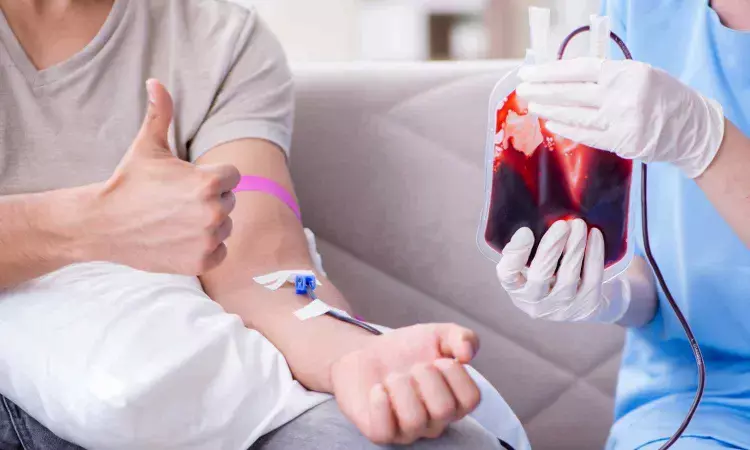- Home
- Medical news & Guidelines
- Anesthesiology
- Cardiology and CTVS
- Critical Care
- Dentistry
- Dermatology
- Diabetes and Endocrinology
- ENT
- Gastroenterology
- Medicine
- Nephrology
- Neurology
- Obstretics-Gynaecology
- Oncology
- Ophthalmology
- Orthopaedics
- Pediatrics-Neonatology
- Psychiatry
- Pulmonology
- Radiology
- Surgery
- Urology
- Laboratory Medicine
- Diet
- Nursing
- Paramedical
- Physiotherapy
- Health news
- Fact Check
- Bone Health Fact Check
- Brain Health Fact Check
- Cancer Related Fact Check
- Child Care Fact Check
- Dental and oral health fact check
- Diabetes and metabolic health fact check
- Diet and Nutrition Fact Check
- Eye and ENT Care Fact Check
- Fitness fact check
- Gut health fact check
- Heart health fact check
- Kidney health fact check
- Medical education fact check
- Men's health fact check
- Respiratory fact check
- Skin and hair care fact check
- Vaccine and Immunization fact check
- Women's health fact check
- AYUSH
- State News
- Andaman and Nicobar Islands
- Andhra Pradesh
- Arunachal Pradesh
- Assam
- Bihar
- Chandigarh
- Chattisgarh
- Dadra and Nagar Haveli
- Daman and Diu
- Delhi
- Goa
- Gujarat
- Haryana
- Himachal Pradesh
- Jammu & Kashmir
- Jharkhand
- Karnataka
- Kerala
- Ladakh
- Lakshadweep
- Madhya Pradesh
- Maharashtra
- Manipur
- Meghalaya
- Mizoram
- Nagaland
- Odisha
- Puducherry
- Punjab
- Rajasthan
- Sikkim
- Tamil Nadu
- Telangana
- Tripura
- Uttar Pradesh
- Uttrakhand
- West Bengal
- Medical Education
- Industry
LNJP Hospital faces leukodepleted blood shortage, over 100 Thalassemia patients affected

Critical Blood Shortage Hits Thalassemia Patients at LNJP Hospital
New Delhi: Delhi's Lok Nayak Jai Prakash Narayan (LNJP) Hospital is grappling with a critical shortage of leukodepleted blood, leaving more than 100 thalassemia patients vulnerable to serious transfusion-related complications for over five months. This disruption has caused distress among patients who rely on leukodepleted blood for safer and more effective treatment.
Despite repeated appeals to hospital authorities, patients alleged they have received no concrete information on when the supply of leukodepleted blood will resume. Speaking to TNIE, one of the patients said, “I'm not receiving leukodepleted blood since April. We have submitted letters to the hospital’s head of department and medical director three times, but we are not being given any exact date or month for when this problem will be resolved or how long we have to wait.”
Also Read:AIIMS Mangalagiri to launch Bone Marrow Transplants
Another patient conveyed frustration about the debilitating effects of transfusions lacking proper blood, explaining that vomiting and severe allergic reactions plague them for three days after each transfusion, severely impacting their ability to work.
Leukodepleted blood, which is filtered to remove white blood cells while retaining red blood cells, is crucial for thalassemia patients as it reduces the risk of transfusion-related complications and ensures safer treatment.
Hospital officials attribute the shortage to a lack of specialized blood bags required for storing leukodepleted blood, a problem linked to the government’s recent shift to centralized procurement of medical supplies. Dr Sunil Kumar, head of the LNJP blood bank, acknowledged the issue and promised that supplies are expected to resume within a week.
“Till the time, we are doing the process with a normal bag,” he said when asked how transfusions are being managed in the interim. When pressed on handling the side effects of transfusion, he said, “The paediatric department looks after such issues. Anyway, the side effects happen to every patient in varying degrees,” reports TNIE.
The situation has drawn criticism from patient advocacy groups. Anubha T Mukherjee, Member Secretary of the Thalassemia Patients Advocacy Group (TPAG), condemned the lack of priority given to thalassemia patients.
According to TNIE, “Thalassemics need leukodepleted blood products to avoid blood transfusion-related reactions. Another alternative is a bedside leukocyte filter, which costs between Rs 600 and Rs 1,200 per bag. Even economically, it doesn’t make sense. What kind of priority treatment is this, and who is actually benefitting from the unavailability of this kind of blood?” she questioned.


